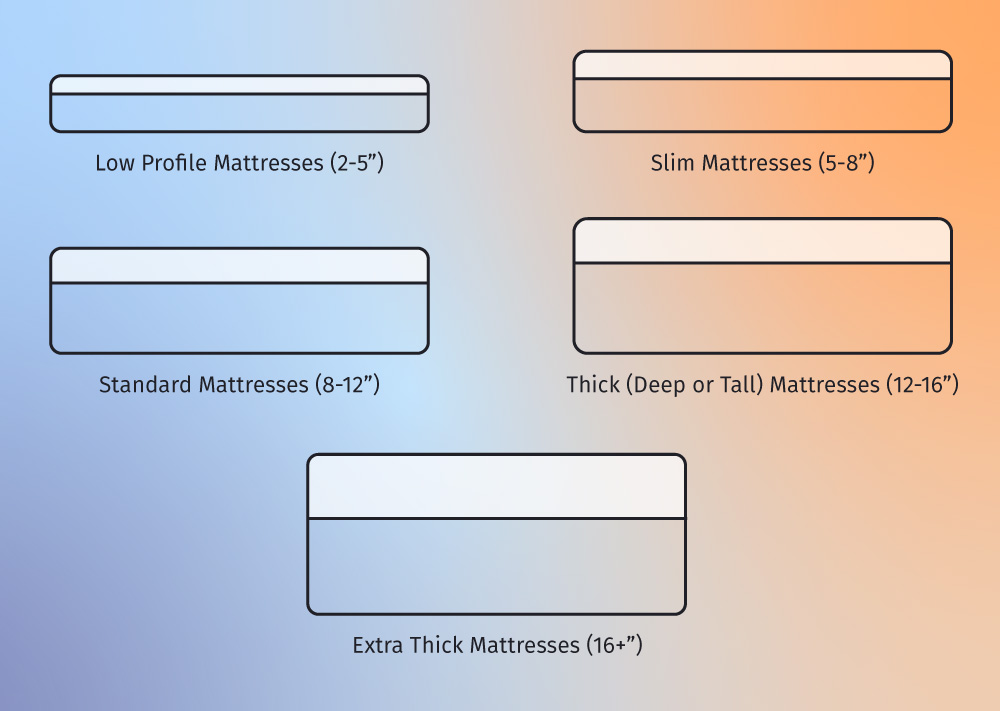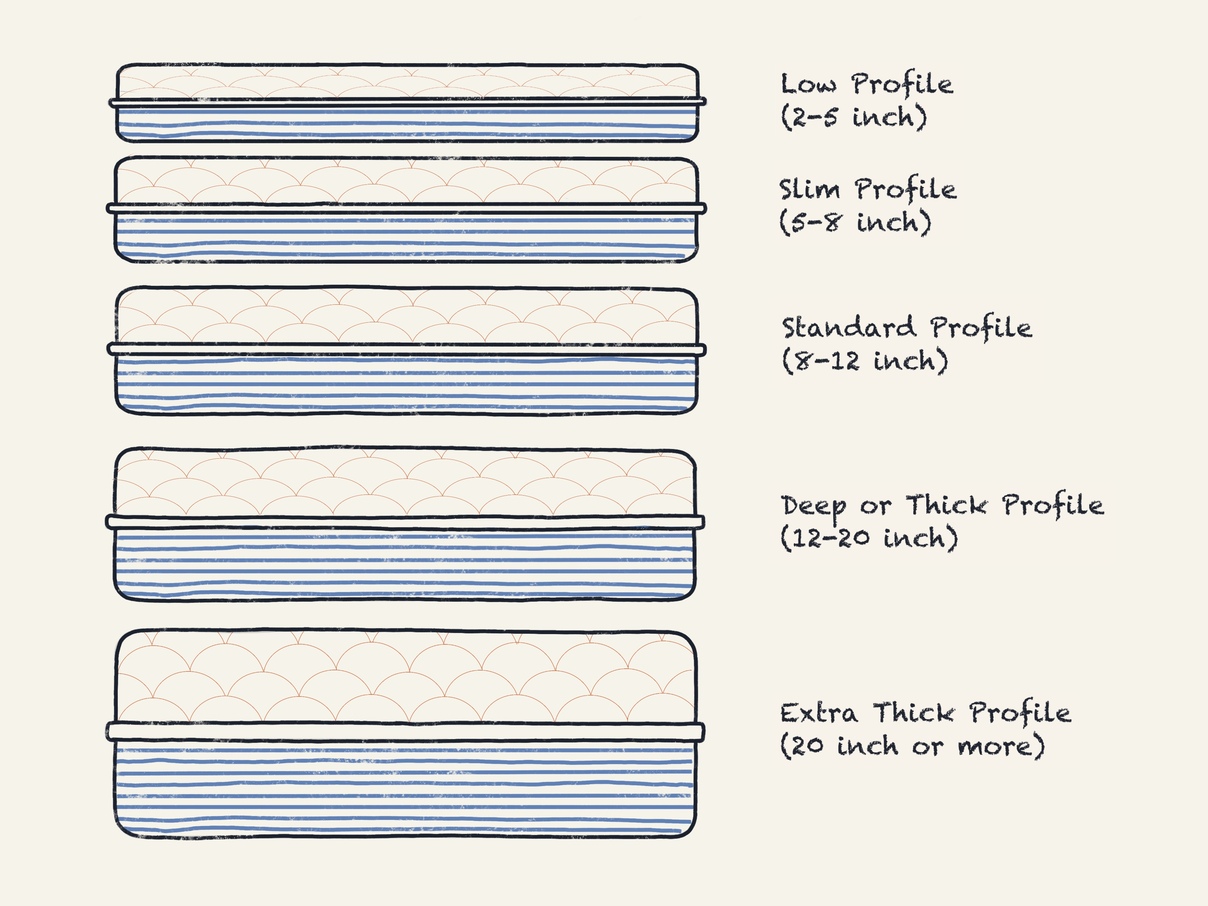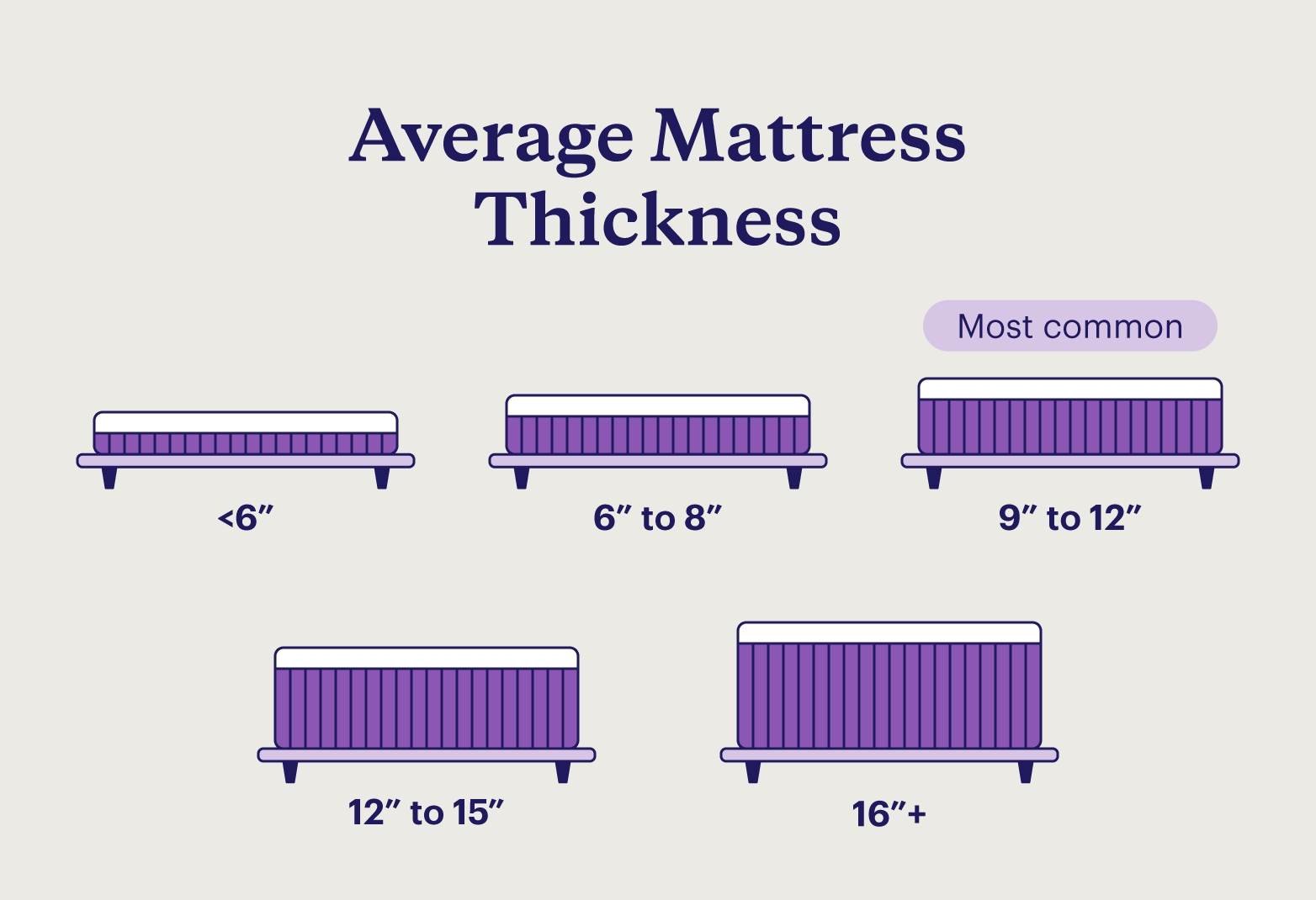When it comes to getting a good night’s sleep, the thickness of your mattress plays a crucial role. You might be wondering, “How thick should a mattress be?”
Your comfort, support, and overall sleep quality depend on finding the perfect balance. Imagine waking up refreshed, free from aches and pains, ready to take on the day. Sounds ideal, right? Understanding mattress thickness could be your ticket to achieving this.
Keep reading to discover how the right mattress thickness can transform your sleep experience and improve your well-being.

Credit: www.mattressclarity.com
Mattress Thickness Basics
Mattress thickness varies, typically ranging from 6 to 14 inches. Comfort and support largely depend on personal preference and sleeping position. Thicker mattresses often offer more cushioning, ideal for side sleepers, while thinner options may suit back or stomach sleepers better.
Understanding the basics of mattress thickness can transform your sleep experience. The right thickness can provide the perfect balance between comfort and support. So, how do you determine the ideal mattress thickness for you? Let’s break it down.
1. What Is Mattress Thickness?
Mattress thickness refers to the overall height from the bottom to the top of the mattress. It plays a crucial role in the comfort and support you receive during sleep. A standard mattress typically ranges from 6 to 14 inches in thickness.
2. Standard Thickness Levels
Most mattresses fall within a few standard thickness categories: – Thin (6-8 inches): These are often used for bunk beds or trundle beds. – Medium (9-12 inches): Common in many households, offering a balance of comfort and support. – Thick (13-16 inches): These provide extra cushioning, often preferred by those who enjoy a plush feel.
3. Factors Influencing Thickness Choice
Consider your sleeping position. Side sleepers may prefer a thicker mattress to cushion their shoulders and hips. Back and stomach sleepers might lean toward medium thickness for better spine alignment. Your body weight also matters. Heavier individuals often find thicker mattresses more supportive. On the other hand, lighter individuals can find comfort in medium thickness without compromising support.
4. The Role Of Mattress Material
Materials can influence how thick a mattress feels. A memory foam mattress might feel different from a spring mattress of the same thickness. Foam tends to provide a more enveloping feel, while springs offer a bouncier experience.
5. Personal Experience: Finding My Perfect Mattress Thickness
I once opted for a 10-inch memory foam mattress, thinking it would be the perfect fit. However, I soon realized I needed more support due to back pain. Switching to a 12-inch hybrid mattress, I found the perfect balance of comfort and support.
6. Considerations For Couples
If you share your bed, consider a mattress that accommodates both partners’ needs. A thicker mattress can minimize motion transfer, helping both partners sleep undisturbed. Discuss your preferences and test options together to find the perfect match.
7. Making The Decision
What do you value more, plush comfort or firm support? Identify what matters most to you in a mattress. Visit showrooms to test different thicknesses and feel the difference firsthand. When buying a mattress, thickness is not just a number; it’s a crucial factor in your sleep quality. Make an informed choice, and you can enjoy restful nights and energized mornings.

Credit: www.dreamcloudsleep.com
Factors Influencing Ideal Thickness
Choosing the right mattress thickness is crucial for a good night’s sleep. The ideal thickness depends on various factors that influence comfort and support. Understanding these factors can help you select a mattress that meets your needs and preferences. Let’s explore these factors in detail.
Body Weight Considerations
Your body weight plays a significant role in determining mattress thickness. Heavier individuals often benefit from thicker mattresses. These provide better support and prevent sagging. A mattress with a thickness of 12 inches or more is usually recommended. For lighter individuals, a thinner mattress, around 8 to 10 inches, might be sufficient. It offers the necessary comfort without being too firm.
Preferred Sleeping Position
Your sleeping position affects the ideal mattress thickness. Side sleepers generally prefer thicker mattresses for better pressure relief. A thickness of at least 12 inches can cushion shoulders and hips. Back and stomach sleepers often find comfort in thinner mattresses. A thickness of 10 inches provides adequate support for the spine.
Existing Health Conditions
Health conditions can influence mattress thickness needs. Those with back pain may require a thicker mattress for extra support. A 12 to 14-inch thickness can help maintain proper spinal alignment. People with joint issues might benefit from a medium-thick mattress. Around 10 to 12 inches, it provides balanced comfort and support.
Common Mattress Thickness Options
Choosing the right mattress thickness is essential for comfort and support. Different thickness options cater to various sleeping needs. Understanding these options helps make informed decisions. Below, explore common mattress thicknesses and their benefits.
Thin Mattresses
Thin mattresses range from 5 to 8 inches. Ideal for children or lightweight adults. They offer basic support without extra cushioning. Perfect for bunk beds or trundle beds. Economical choice for guest rooms.
Medium Thickness
Medium thickness mattresses are 9 to 12 inches. They offer balanced support and comfort. Suitable for most sleepers, including couples. Provide adequate cushioning for back and side sleepers. Popular in master bedrooms.
Thick Mattresses
Thick mattresses measure 13 to 16 inches. Luxurious feel with enhanced comfort. Best for heavier individuals needing extra support. Ideal for plush hotel-like sleeping experiences. They offer deep cushioning for joints.
Pros And Cons Of Different Thicknesses
Mattress thickness affects comfort and support. Thicker mattresses often provide more cushioning, ideal for side sleepers. Thinner options can be firmer, suitable for back sleepers or those with limited mobility. Each thickness offers unique benefits, so consider personal sleep preferences and needs.
When choosing a mattress, its thickness can significantly impact your sleep experience. But how do you know what thickness is right for you? Each option, from thin to thick, comes with its own set of pros and cons. Understanding these can help you make an informed decision that leads to restful nights and refreshed mornings.
Advantages Of Thin Mattresses
Thin mattresses, typically ranging from 5 to 8 inches, are often lightweight and easy to move. This makes them an excellent choice if you’re constantly rearranging furniture or live in a small space. They also tend to be more budget-friendly, which can be a huge plus if you’re outfitting a guest room or a temporary living situation. However, the biggest advantage is their suitability for children or people with lower body weight. Thin mattresses offer enough support without feeling overly firm. Is a thin mattress the perfect balance between comfort and practicality for your needs?
Benefits Of Medium Thickness
Medium-thickness mattresses, generally 9 to 12 inches, strike a balance between comfort and support. They provide enough cushioning to relieve pressure points, making them popular among side sleepers. If you’re someone who tosses and turns, this thickness might help you find a comfortable position faster. These mattresses also tend to be versatile, catering to a wide range of body types and sleeping positions. Have you ever noticed how hotels often use medium-thickness mattresses? That’s because they cater to various guests with different sleep preferences, offering a universally comfortable experience.
Drawbacks Of Thick Mattresses
Thick mattresses, often 13 inches or more, might seem luxurious and inviting, but they come with drawbacks. They are heavier and more cumbersome, making them difficult to move or rotate. If you live in a home with narrow staircases, getting a thick mattress to your bedroom could be a challenge. Additionally, they might not be suitable for all bed frames. Some frames may not support the extra weight or height, leading to structural issues or an awkward fit. Are you willing to compromise ease of handling and compatibility for extra plushness? Choosing the right mattress thickness involves weighing these factors carefully. Consider your lifestyle, sleep habits, and space limitations to find the mattress that will offer you the best night’s sleep.
Choosing The Right Thickness For You
Choosing the right mattress thickness can impact your sleep quality. The perfect thickness varies for each person. It depends on personal preferences and practical factors. Let’s explore how to select the best mattress thickness for your needs.
Personal Comfort Preferences
Comfort is key when selecting a mattress. Some people prefer a thick, plush surface. Others like a firmer, thinner feel. Consider how you sleep best. Do you sleep on your back, side, or stomach? Your sleeping position can influence your comfort level. A thicker mattress may offer more cushioning. A thinner one might provide better support. Test different thicknesses to find your perfect fit.
Budget Considerations
Your budget plays a role in mattress selection. Thicker mattresses often cost more. They use more materials and offer enhanced features. But a higher price doesn’t always mean better comfort. Consider your budget carefully. Determine how much you can spend without compromising quality. Sometimes, a medium-thickness mattress can offer the best value. It balances comfort and cost effectively.
Space And Aesthetic Factors
Think about the space in your bedroom. A very thick mattress might not fit well in small rooms. It can overpower the space and make it look crowded. Also, consider the height of your bed frame. A thick mattress on a tall frame can be hard to climb into. A thinner mattress might suit a minimalist style. It can also create a sleek, modern look. Balance function and style when choosing mattress thickness.

Credit: purple.com
Expert Recommendations
Choosing the right mattress thickness can enhance sleep quality. Experts from different fields offer their insights on this topic. Each brings unique perspectives that can guide you to the perfect sleep solution.
Advice From Sleep Specialists
Sleep specialists suggest a mattress thickness of 10 to 14 inches. This range provides adequate support and comfort. It also suits most body types and sleep positions. Thicker mattresses offer more comfort layers, enhancing sleep quality.
Insights From Chiropractors
Chiropractors emphasize spine alignment and support. They often recommend a thickness of 8 to 12 inches. This range supports the spine while reducing pressure points. It helps avoid back pain and improves overall sleep health.
Tips From Interior Designers
Interior designers consider aesthetics and functionality. They suggest choosing a mattress thickness that complements your bed frame. Typically, a mattress height of 10 to 12 inches fits most modern styles. This thickness balances comfort and visual appeal in a room.
Maintenance And Longevity
A mattress is more than just a sleeping surface; it’s a long-term investment in your comfort and health. The thickness of your mattress plays a significant role in its maintenance and longevity. Let’s explore how different thicknesses impact caring for your mattress and its overall lifespan.
Caring For Different Thicknesses
Mattress thickness can vary from around six inches to over twenty inches. Each thickness demands unique care to ensure durability. Thinner mattresses, often seen in guest rooms, require regular flipping to prevent uneven wear. This simple act can extend their life by years.
In contrast, thicker mattresses, which offer luxurious comfort, need more attention. Their weight might make flipping a challenge, but using a sturdy mattress protector can shield them from spills and dust. You’ll also want to rotate them occasionally to maintain even support.
Do you treat your mattress like a prized possession? Regular vacuuming and airing can keep both thin and thick mattresses fresh, ensuring they remain a cozy haven for restful nights.
Impact On Mattress Lifespan
The thickness of your mattress can directly affect how long it lasts. Thinner mattresses might seem like a budget-friendly option, but they often wear out faster. You may notice sagging or lumps within a few years without proper care.
Thicker mattresses, while generally pricier, offer better longevity. They are designed to distribute weight more evenly, reducing the risk of wear and tear. Investing in a high-quality, thick mattress can be a wise decision for long-term comfort.
Have you ever wondered if a thicker mattress is worth the investment? Consider how much you value uninterrupted sleep and whether the peace of mind from a durable mattress is worth it for you.
Ultimately, how you care for your mattress can make all the difference in its lifespan. Whether you opt for a thin or thick mattress, attention to maintenance ensures years of restful sleep.
Frequently Asked Questions
What Is The Ideal Mattress Thickness?
The ideal mattress thickness ranges from 8 to 14 inches. It depends on personal preference and sleeping needs. Thicker mattresses offer more support and comfort. However, thinner mattresses can be sufficient for lighter individuals. Consider body weight and preferred sleeping position when choosing the right thickness.
Does Mattress Thickness Affect Comfort?
Yes, mattress thickness greatly affects comfort. Thicker mattresses provide more cushioning and support. They are ideal for heavier individuals and side sleepers. Thinner mattresses can feel firm and may not offer enough support for some. Choose a thickness that aligns with your comfort preferences and sleeping style.
How Does Mattress Thickness Impact Support?
Mattress thickness impacts support by influencing its ability to contour to the body. Thicker mattresses generally offer better support. They can distribute body weight more evenly. This helps in reducing pressure points. Thinner mattresses might lack the necessary support for heavier individuals or specific sleeping positions.
Is A Thicker Mattress Always Better?
Not necessarily. A thicker mattress isn’t always better for everyone. It depends on individual needs and preferences. Thicker mattresses offer more support but can be too soft for some. Consider factors like body weight, sleeping position, and personal comfort when choosing mattress thickness.
Conclusion
Choosing the right mattress thickness is essential for comfort and support. Consider your sleeping position and weight when deciding. Thicker mattresses often provide better cushioning. They can relieve pressure points. Thinner mattresses may suit some, especially if space is limited.
Balance is key. Too thick or too thin can affect sleep quality. Test different options if possible. Remember, personal preference plays a big role. Comfort should always come first. A good night’s sleep starts with the right mattress. Make an informed choice for restful nights.
Sleep well and wake refreshed every day.
